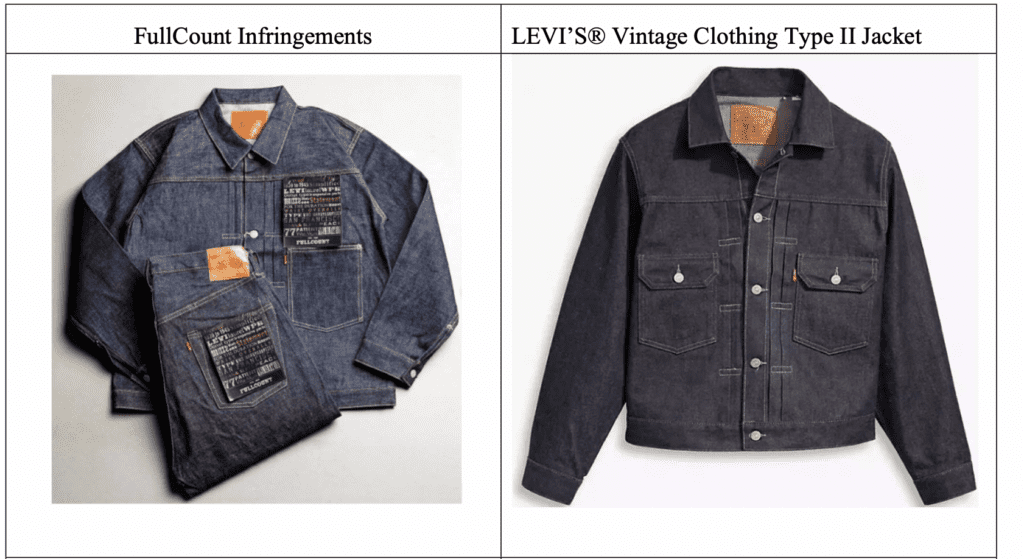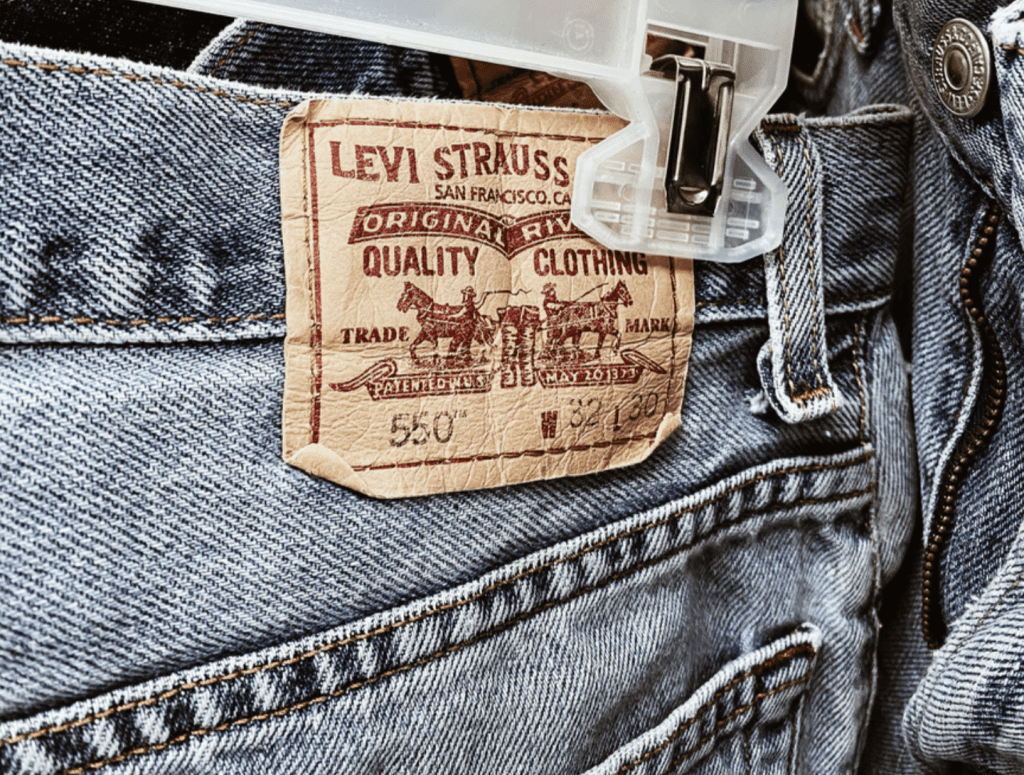In the latest leg of an ongoing legal battle that may not see an end any time soon, Levi Strauss & Co. (“Levi’s”) has filed a new lawsuit against FullCount Co Ltd., accusing the Japanese apparel company of “manufacturing, distributing and/or selling garments” that infringe its famous trademarks, despite being subject to permanent injunctions as a result of previous lawsuits. In its complaint, which was filed with the U.S. District Court for the Northern District of California on September 12, Levi’s alleges that FullCount is acting in “contempt of [the] court” by continuing to sell products with “nearly-identical copies” of Levi’s Tab, Arcuate stitching, and “501” trademarks even though previous court orders over the last decade have permanently barred the company from doing just that.
Among the products allegedly infringing Levi’s trademarks are FullCount’s “1933 501 jeans,” which feature a “pocket flasher” that prominently displays the words “LEVI,” “501,” and “San Francisco,” which Levi’s claims are an obvious attempt to invoking its iconic branding. Levi’s also points to FullCount’s use of “an additional pocket flasher that blatantly copies [its] Guarantee Ticket trademark,” an authenticity-focused mark that Levi’s says it has used for over 125 years.
Levi’s alleges that these actions are part of a broader, manipulative strategy by FullCount to “co-opt [its] brand and reputation” even in light of the court’s previous injunction orders.

Some Background: The case follows from a decade-long clash between Levi’s and FullCount. Back in 2007 and then again in 2016, Levi’s successfully sued FullCount for trademark infringement, resulting in permanent injunctions that barred FullCount from manufacturing, selling, or distributing apparel products that make use of Levi’s trademarks – such as the LEVI’S, 501, and Tab marks – without Levi’s authorization. Regardless of those previous actions, Levi’s claims that FullCount has continued to engage in “the wrongful conduct alleged herein,” violating the court’s permanent injunctions in the process.
Levi’s Claims Contempt, Counterfeiting
At the core of Levi’s new lawsuit is its accusation that FullCount is in contempt of court as a result of its failure to comply with the court’s previous injunction order. Specifically, the San Francisco-based denim argues that FullCount is once again engaging in trademark infringement and counterfeiting, as well as trademark dilution.
In its complaint, Levi’s alleges that in the wake of a previous court ruling, FullCount has resumed manufacturing and selling products that bear designs that infringe its Tab Device, Arcuate stitching design, and “501” marks, all of which have become synonymous with the Levi’s brand. In fact, Levi’s maintains that in furtherance of its “latest effort to free-ride on [the Levi’s] brand,” FullCount has actually “increase[d] production and promotion of” the allegedly infringing wares.
With the foregoing in mind, Levi’s is seeking sanctions against FullCount for its “willful and blatant” violation of the court’s injunctions, including “sanctions to coerce obedience of the court’s injunction orders and/or to compensate [Levi’s] for losses resulting from FullCount’s contemptuous behavior.” The company argues that this continued disregard for the court’s authority not only damages its reputation but also undermines the legal system’s ability to enforce intellectual property rights.
Alongside the contempt allegations, Levi’s has lodged claims of trademark infringement and counterfeiting, arguing that FullCount’s actions demonstrate “an intentional, willful, and malicious intent to counterfeit [its] federally registered trademarks” in connection with the sale of infringing products. According to Levi’s, FullCount has been manufacturing and selling apparel items that bear “nearly-identical copies of [its] trademarks” in collaboration with U.S. retailers Franklin and Poe Trust Company LLC and Standard & Strange, who are also named as defendants in Levi’s lawsuit.

For instance, Levi’s argues that FullCount is using a small fabric tab on its jeans that mimics Levi’s well-known Tab trademark in an effort to deceive consumers into thinking they are purchasing authentic Levi’s products. The Red tab, Orange tab, and other variations of the Tab “trademark family” have been key elements of Levi’s branding for decades, the company claims, and as a result, their misuse by FullCount is “likely to cause confusion, mistake, or deception” as to the source of the latter’s products.
Levi’s similarly accuses FullCount of misappropriating its “501” trademark by including the word mark in the names of its own products, such as the “1933 501 jeans” and “1922 501 jeans,” as well as its trademark-protected Arcuate stitching design, giving rise to its trademark infringement and counterfeiting claims.
In case that is not enough, Levi’s also claims that FullCount has attempted to imitate its collaborations with high-end designers and other fashion houses. One example, per Levi’s, is FullCount’s creation of garments that resemble those in Levi’s official collaboration with Japanese retailer BEAMS. This tactic is aimed at falsely implying that FullCount’s products are part of a “legitimate relationship between [it] and [Levi’s],” the company argues.
Aside from trademark infringement and counterfeiting, Levi’s alleges that FullCount is on the hook for trademark dilution because its use of misappropriation of Levi’s “distinctive and famous” marks is diminishing the distinctive quality of those marks, as well as unfair competition in light of FullCount’s use of the Levi’s trademarks in a way that “falsely describes its products” and “is likely to cause confusion, mistake, or deception” among consumers.
FullCount was not immediately available to provide a comment about the case.
The case is Levi Strauss & Co., v. FullCount Co LTD, et al., 3:24-cv-06448 (N.D. Cal.)














